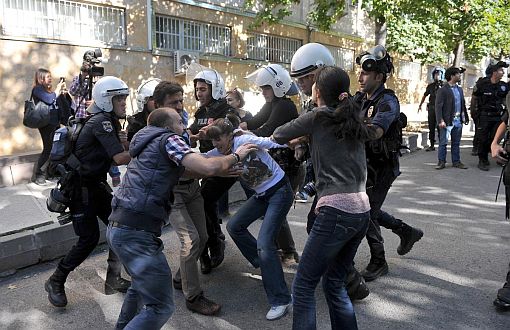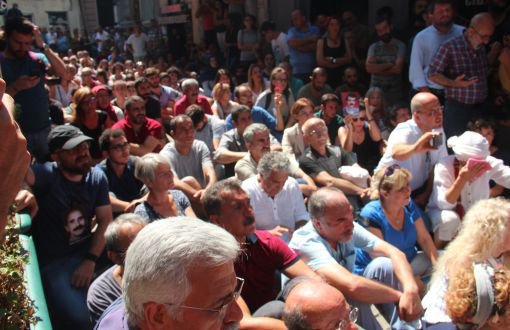Click to read the article in Turkish
"The universities in both countries are under the pressure of the same system. But the greatest difference between these two countries is this: In Turkey, we took a firm stand against this systematic transition, and it still continues"
What are the similarities and disparities between the academia in Germany and Turkey, and how are these being experienced? What expects the academics who went from Turkey to Germany?
Academic Zeynep Kıvılcım, who has been living in Berlin for one year, tells us about the situation of the academics in both countries.
Assoc. Prof. Dr. Zeynep Kıvılcım was discharged from her position at İstanbul University Faculty of Political Sciences over signing the peace declaration "We will not be a party to this crime" that was shared with the public by the Academics for Peace. She came to Berlin one year ago and has lectured in various universities since then. Currently, she is doing research on the topic "European Union - Turkey Refugee Agreement".
Stating that in both countries, the academia was under the pressure of the neoliberal system, Kıvılcım, based on her own experiences, characterizes the difference between the two countries:
"There is a firm stand against this system in Turkey. But it is surprising, that almost no one is fighting against this neoliberal transformation at the universities in Germany".
As an example to this, she points to the fact that the achievements accomplished in Turkey regarding employment security, were in the monopoly of only professors in Germany and that mostly only male professors could enjoy these achievements in the first place.
Stating that many academics coming from Turkey were being guided to apply for asylum, Kıvılcım said:
"When I first came here, many people used to say 'everyone escapes from Turkey but only the ones who can make it to Germany, survive', but there is no such thing. Here, away from the struggle in Turkey, I feel bad. I want to be able to return to Turkey".
Entering the campus: "There are no police but certain rituals"

Usually, the first impression about the universities outside of Turkey, is that there are no security personnel at the doors. After leaving İstanbul University, how do you experience this difference in the universities in Germany?
I spent the last four years lecturing at universities in different cities, I also gave some seminars in a couple of universities. I had some experience in five or six universities. I can talk in the light of these experiences.
I worked at İstanbul University for 16 years. But since you mentioned it, I had not recognized that there was this kind of a difference between the universities in these two countries.
At İstanbul University, there are police, civil police, special security staff, restrictions and sometimes questionings of those who want to enter the university. But comparable to this, there is an immense amount of bureaucracy, registration procedures and obligations to obtain university cards in Germany. There is no such thing as police control at universities in Germany but a ritual while entering these places.
"Rather sophisticated methods of control"
At some point, there is an unhumaned security here. Teaching staff scan credit-card like cards and open the doors to the classrooms with keys that they get by opening a panel inside the wall. When the class is dismissed, they lock the doors and put the keys back to their place that can be opened with digital cards. In times, where there is no class, the classrooms are always locked. There are no security staff at the doors but one cannot go to someone to ask for a key, you have to deal with a maschine.
I did not get the impression as if there was no control. There is no such thing like pat-down search or fiddling around in bags, but there is still control, in my opinion. There is something that is more refined. It is not attacking but there is a rather refined intervention that is much more advanced and sophisticated than the methods in Turkey.
What we have in Turkey, is much more humane, there is staff opening and closing the doors, he stands somewhere by the entrance, here there is no such thing. Once, someone who lectured before me, had forgotten to put the key back to its place. In such situations, you cannot open the door. There is an unhumaned system.
Classrooms: "Clearer distinction between teachers and students"
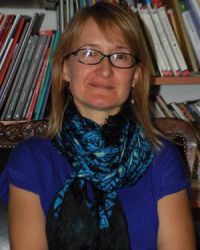
How would you compare Germany and Turkey, in terms of the constellation and the students you encounter when you enter the classroom?
Last year, in classes that I lectured, there were many students who were not from Germany. Since I teach in English, I had many students who came with an exchange programme. What I am telling, does actually not concern students from Germany.
But although not all students are from Germany, they do take classes that are formed within the German system. Thus, we all are within the mechanisms under this system. There is a rather hierarchical system in Germany. What we actually try to avoid in Turkey regarding the teacher-learner relation, meaning the distinction between the lecturers and students, is much more apparent and clearer here. And every other aspect is situated according to this.
Annoyed of the hierarchy in Turkey, I tried to adopt certain methods and I was teaching with the feminist methodology. It is rather difficult in Turkey, since we have a hierarchical education system but the hierarchy is much more stronger.
"The setback in collective learning"
There is a flexible structure called "modules" in the German education system. Everyone can kind of prepare her/his own transcripts. While a student can say that she/he wants eight credits of a course, another one can have only three.
Here, students orient themselves according to how many credits they aim for. And this leads to a situation that disrupts the collective learning in the class.
An environment of collective learning is something I value. Through collective learning, we all monitor each other's learning process, we aim for it and we make efforts for it. But in Germany, this becomes difficult, when diverse people aim for very different goals. Everyone has their own menu in their hands and they act according to these to achieve their goals.
The advantage of the system in Germany, is that it provides space for the students' desires. But on the other hand, it prevents the class from being a collective space. Everyone is engaged in something that is only related to themselves.
Employment Security: "Strong stance against transformation in Turkey"
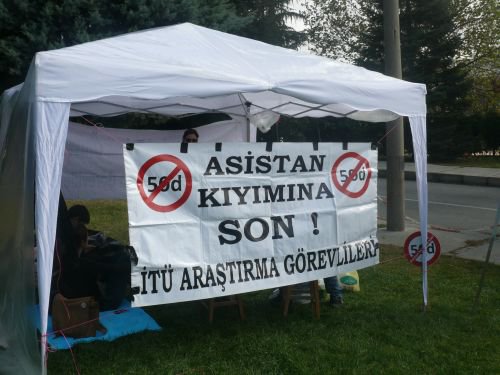
* From the protest at İstanbul Technical University / 2013
One of the main struggle areas in Turkey is concerning the employment security. How would you compare Germany and Turkey with this respect?
The universities in both countries are under the pressure of the same system. That is a common aspect for both countries.
In both countries, there are similar trends such as cutting back state subsidies for public universities and funding rather private universities as well as the fact that the academics themselves have to find such funds.
The biggest difference between the two countries is that, in Turkey, we took a strong stand against this systematic transformation and this still continues. We know what we are standing against. The resistance continues with the knowledge, what this stand corresponds to in political terms, that this is the reflection of where you stand within the system and that your resistance also has a political importance.
Pertinacity is crucial during this struggle. We are faced with very cruel state instruments. A state that can inflict physical violence, a state that can discharge people. But despite all this, there is a serious resistance. The resistance of the university assistant staff for their employment security is an example of this. We, academics from Turkey, come from such a background and have such experiences.
"In Germany, there is almost no resistance against the system"
With this respect, the academia in Germany is in a pretty bad situation. It is no surprise that the universities in Germany are under similar pressures, this is a systematic phenomenon. This system has earned itself some great space here. There are very few areas, that is has not managed to conquer yet. At first, you are shocked when you first realise this situation.
We work and do research in public universities in Germany. It is surprising that almost no one stands against this neoliberal transformation in universities in Germany. It is not like they say "We did this and that, but it did not work out", everyone has rather accepted the circumstances. Better said, there is even nothing that people came to terms with, it is rather like an understanding of "it is/has always been like this".
What is sad about all this is that the system is being experienced as a daily violence in these universities. Each year, one has a 10 month-contract that is limited to the current academic year. When you first begin working, you already have to look for a position, for your next contract. There is continuously something that keeps you tense. You have to apply to other positions while you are lecturing. Even during the time, when you do have a position, this makes you feel insecure.
"In Germany, the only ones who have securities, are professors, and they are mostly men"
It has only been a year since I came to Germany. Therefore my observations regarding the academia in Germany is of course restricted. But, I must say that I am pretty surprised. They say the academia in Germany is "very competitive". The labour exploitation is being called competition here. Also in Turkey, there was an attempt to legitimize the transformation in a similar way.
In Germany, only professors are tenured, and their employment is permanent. The employment security that we earned by struggle in Turkey, is only granted to professors here. And most of these professors are men.
"Many cannot pay their rents"
As far as I could observe in my first year, the projects that provide a financial connection to the academia, are also being granted to professors. The professor who receives the project, also determines who should be assigned to the project. Also your résumé and publications play a role in whether you get assigned to a project or not, but your relationship with this professors counts the most. The assignments are being determined on basis of private relationships. The professors form their teams with the people they know. At the same time, most of the people who work on the project, receive very little income.
The largest group among the "unsecured" is the post-doc group. They earn their living working on various projects, many people have to work on more than one project at the same time and none of these projects can offer them enough income. When you lecture as a post-doc, you only receive a very limited salary and it is not possible to live on this amount.
If you don't have a doctoral degree, but your professor tells you to lecture her/his class, you most probably don't get paid at all. And this is considered normal here. It is the same in the biggest and most known universities. They think, "you should be pleased, since you can mention the classes you lecture in your résumé".
Academics, who do a doctorate, lecture and work in projects but still cannot pay their rents are very common here. The ones who work in projects, also do a lot of administrative work. In some universities or faculties, administrative staff is very few.
"They cannot see into the system that is the source of the problem"
We had similar experiences in Turkey as well, but there was some resistance like "Why must I also do administrative work", "I do not have to, so I should also get paid for the administrative work I do" and "This should not be the payment for my academic work". None of these is being discussed here.
When you ask someone "Why is your tenure not secured?", they feel embarrassed for and ashamed of their precarity. There is a resignation. They say "since I am not that qualified, I could not get a secured tenure". But actually, it is impossible to be "that qualified". The secured positions are already so few and they are only for professors. They cannot see into the system, that is the source of the problem.
Unions: "I continue my legal struggle with support of the union"
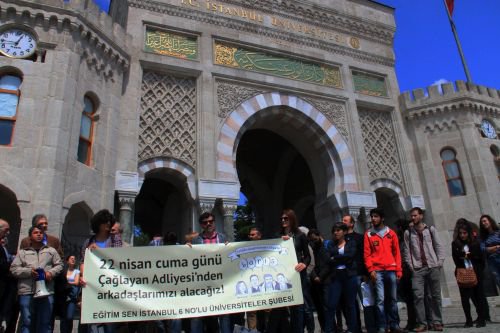
* Call for solidarity with academics who were arrested over signing peace declaration / 2016
Unionisation plays an important role in fight against employment insecurity. What are the differences in Germany and Turkey with regards to unionisation?
Trade Union of Education and Science Workers (Eğitim Sen) İstanbul 6th Department of Universities, that I am a member of, played a crucial role during this process that I have been going through for this last two years, and in general as well. I used to criticize Eğitim Sen at many points, I still do, but during our fight, it has become the union where we could exist with all our troubles.
The union still provides financial help to all its members who were discharged from their positions and in these two years, it has provided them legal support free of charge as well.
"While discussing immigrant workers, we became some ourselves"
The unionisation rate is very low in Germany. There are very few academics in universities who are unionised. The effectiveness of the unions in universities is very low. The reason for this might be the historical background of the unions but I do not have enough knowledge on the history of the unionised struggle in the academia yet.
This weakness of the unions makes one feel much more weaker as well. Here, I immediately became a member of the union. But all the events are being held in German. Here, we became the subject of the discussion regarding the position of the immigrant workers in unionisation process, that was also a topic of discussion in Turkey. Despite the good intentions of the union, I, as an immigrant worker, cannot understand nor attend the activities that are being held in German.
Here, were are members of the GEW, that is a sister union of Eğitim Sen in Germany. It tries to become a union but it is not really unionised within the academia yet. Maybe the wave of migrating academics before us was not that massive. And maybe, new steps will be taken in accordance with our demands. But GEW has provided a great support for the Academics for Peace - Germany (BAK-Germany) during the process of being registered as an association and it still does.
Colleagues
How is the approach of your colleagues in Germany to the matter?
Also in Germany, there are many different types of academics like in Turkey. Some academics are in great solidarity with us. In each sentence, one can sense, that these academics do know that the solidarity is actually political and that what we experience means something.
Meanwhile, another group secretly feels angry and annoyed inside, when an academic from Turkey gets a two year-contract while they cannot even get a six month-contract themselves.
And another group does not even care that much.
Class: "We are being guided to apply for asylum"
What do you experience in your life outside of the academia?
Since we came to Germany, almost all of us have been guided to apply for asylum at some point. When you apply for a residence permit with your documents, you get a negative response and are told to apply for asylum. I experience the same thing over and over again, when I apply to re-new my residence permit every 10 months. Applying for asylum is a decision. If I decide to not apply for asylum depending on my circumstances, and do have the necessary documents for a residence permit, why should I seek asylum? They try to drive us into the corner saying "Either you go back to Germany or you seek asylum".
I could not understand the reasons behind this at first. I used to think, "I have a one year-contract, the university has also accepted to pay me a salary, but the foreigners department doesn't. When I apply for asylum, I will not be able to work until my application is processed and the state of Germany will have to support us financially, so why do they force us to apply for asylum?" I consulted with a German lawyer friend on this matter and my friend's interpretation was this: Neither the German state nor the German system aims for integration, a concept that is not accepted within the migration culture anymore. On the contrary, rather than integrating the immigrants, a system has been adopted, that tries to keep you on the margins of the society and cause disintegration there. By forcing you to apply for asylum, they try to push you to and keep you at the edge. Thus, they can have an immense control on you. But by applying for a residence permit, you actually resist to this system. By doing so, you actually want to place yourself and enter directly into the middle class. And the system reacts back and wants to push you aside.
"Do you live in Kreuzberg?"
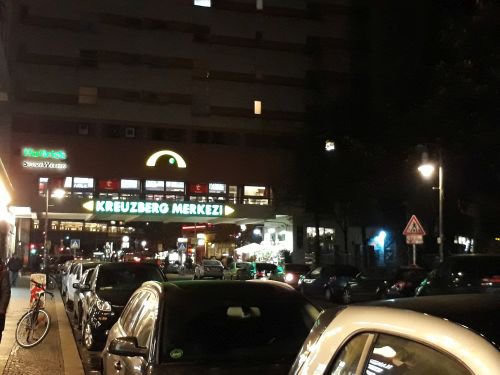
Some German colleagues as well are surprised that we are on the course of directly entering the middle class. We receive questions like "Which district do you live in, is it not too expensive for you there?". But we actually do the same work and work in the same department with these people. But they mostly are not able to hold themselves back and end up asking such questions. "You have to be the 'victim', but you are not!" is actually what they want to say.
This understanding does not only arise from the system and its enforcers, but also from the society itself. When you say "I come from Turkey, I am an academic", even our political colleagues ask: "Do you live in Kreuzberg?". And I answer "Actually I would love to, but I cannot afford the rents there". For them, it is where people who come from Turkey, live in Berlin. And when we say that we don't, they are surprised and they feel like as if we enter into their spaces, the space of people from Germany.
Turkey or Germany?
After all the things you told, what are your feelings towards Turkey and Germany?
I want to return to Turkey. I do not want to stay here for a long time. I do not belong here and I do not want to grow old here.
We signed this declaration because we felt as a part of the struggle of the peoples of Turkey and because we felt responsible for these. We did this for ourselves, otherwise we would not be ourselves.
But afterwards, when we came here, there was an expectation that we "just be academics here, as if nothing had happened". But this is not true. I already had a tenured position in Turkey, I could lecture, go abroad for congresses and get my salary. If this was what being an academic means, I was already able to do that in Turkey. If I were someone who thought this was what being an academic meant, and lived that way, I would not have been here anyway.
Should I be a totally different person here? Should I suddenly become someone who only does academic studies and fills her/his résumé? This is what is being expected from me, as a necessity of the system that currently dominates in the academia. And this is politically very problematic for me.
"I want to be able to return to Turkey"
I am a part of the peoples of the country where I live in. Doing something in this matter is my responsibility even if it is only a thousandth of what others accomplish, who are engaged in this matter. What we did was a little thing but since the political authority fiddled that much with it, our signature turned into being an important thing.
At the moment, I also feel responsible about the issues in Turkey. And this is not something that can easily go away. Most of us ask ourselves, at least once a week, "What I am doing here?", "Is this actually the place where I should be right now?". This questioning is actually the most determinative thing in my life.
Living in Berlin is an opportunity. Berlin is a city that welcomes one well. I do not feel any alienation with regards to living in this city. But concerning Turkey, many of my friends and comrades who were by my side during many struggles before the declaration, are still there, the students are still there, many of my friends do not go abroad although they could, they remain in Turkey and fight. When I first came here, many people thought "Everyone escapes from Turkey, but only the ones who can make it to Germany, survive". But that is not true. Here, away from the struggle in Turkey, I feel bad. I want to be able to return to Turkey. (BK/DG)
* Photographs: Beyza Kural / bianet
BERLIN, HOW FOUR ACADEMICS SEE IT
Academic Kıvılcım: In Both Countries, Universities Under Pressure of the Same System
Academic Kaya: Struggle in Berlin Forms According to Needs of the On-going Struggle in Turkey







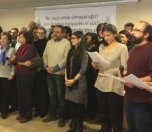
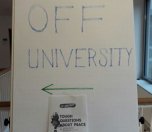
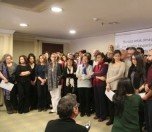
.jpg)
.jpg)
